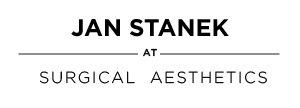60 seconds with top plastic surgeon - Jan Stanek
/What do you enjoy most about being involved in cosmetic surgery?
I see cosmetic surgery as an art, it's something I have always wanted to do and enjoy. The ability to improve peoples lives (not change) is a challenge, it allows me to be creative, surgery is not mechanical it's an art that reshapes and improves a persons appearance.
How has cosmetic surgery changed to when you first started in the industry?
Cosmetic surgery results are becoming more predictable and more sophisticated, people are more aware of what can be done. The procedures are much more refined with better results, surgery is much safer. A lot more surgeons are becoming specialised in specific procedures, which means they have more experience in their chosen field. This was not the case 10 years ago.
Tell us more about your new procedure 'Fraxel Laser'?
Fraxel Laser destroys a layer of the skin to produce new skin (rejeneration). With this, healing is quicker and side effects like bruising, swelling, redness are considerably less. With Fraxel only 20% of the surface skin area is treated. Fraxel requires a series of sessions to fully benefit and get the best results.
Are medical technology devices having a big impact on the cosmetic industry?
Absolutely, more and more people seek treatments that have less downtime.
What do you think of plastic surgery portrayed in the press?
There is a lot of interest in the press on cosmetic surgery. I think on the whole cosmetic surgery is portrayed fairly well.
There is a wider Age group who are considering cosmetic surgery including people over 50. These people are looking in the mirror and they don't see a reflection of how they feel. Due to the increase in the age of the population, people are living longer and therefore consider surgery.
Do you think this has paved the way to making surgery more accessible and socially acceptable?
Certainly, cosmetic surgery is more socially acceptable. However, cosmetic surgery is not the solution for everyone and therefore it is important to ensure you are the right candidate and most important understand that with surgery has risks.
Improving appearances can increase self esteem. It is important to ensure that anyone considering cosmetic surgery are mentally prepared.
What advice do you give to a client who has unrealistic expectations?
During the consultation it is important that the patient has realistic expectations. I explain to all my clients what I believe I can achieve for them. If this falls outside of their expectations I recommend they get a second opinion from another surgeon.
For example I would explain to a patient that a face-lift can make them look younger but not 25 years younger.
What is your view on how available Cosmetic Surgery has become in the last few years?
Most patients obtain information prior to consultation on the particular procedure area. I am finding more people are getting information from the internet which just shows how available cosmetic surgery has become.
How important do you think it is for patients to review and read about industry specialists like yourselves prior to contemplating surgery?
Sometimes you can read about suggestions but it doesn't necessarily mean that they have a lot of experience, it's important to question the experience of the surgeon and find out how many times they have performed the particular procedure you might be interested in.
Finally, where do you anticipate or hope cosmetic surgery will be in 10 years time?
There will be less surgery performed, genetic engineering, drugs and creams may play a big part in antiageing. There will be more focus on preventing ageing by reducing time in the sun, smokers quitting, and most importantly lifestyles changing.









